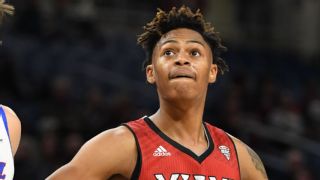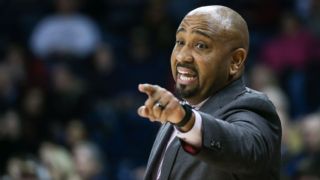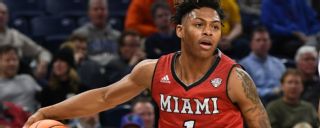|
There is little reasonable debate that the NCAA's transfer policy and waiver process is a hot mess. Actually, it can be better characterized (to echo the description of another recent event) as a hot mess inside of a dumpster fire. It's a system with a Byzantine set of rules that allow schools to have a say over whether their departing players can gain immediate eligibility at their chosen destinations. That said, players, coaches and administrators largely handle such transfers and waiver requests with common sense and cooperation. Some, however, do not. Nike Sibande has experienced the latter. Sibande is a 6-foot-4 rising senior guard from Indianapolis who spent the past three seasons playing for Miami (Ohio) of the Mid-American Conference. In June, Sibande decided to transfer to the University of Pittsburgh. Through Pitt, Sibande became one of more than 100 men's college basketball players during the current cycle who filed an NCAA waiver request for immediate eligibility. Especially in this age of the coronavirus pandemic, the majority of such waiver requests have been granted, but Sibande is one of seven players during this cycle to have his request denied. The NCAA does not comment on individual eligibility cases, but insiders with knowledge of NCAA compliance issues told me that a common thread in its denial of waiver requests is a lack of support by the school from which the player is intending to transfer. Miami did, in fact, refuse to support Sibande's waiver request. Wanting to understand the basis of the refusal, I reached out to Miami coach Jack Owens and associate athletic director of compliance Brad Corbin to get some background on the decision. Owens told me he loved Sibande and would do anything he could to help him, but that Sibande alleged in his waiver request that Miami had "run him off," meaning there was no place for him on the team. Owens said that contention was simply untrue and that there was a scholarship available to Sibande when he decided to transfer. Owens said he would not lie to suggest that Sibande, a former All-MAC player and the 2017-18 conference rookie of the year, had been run off. Entirely reasonable. I asked Owens whether there was any way for Miami to generally support Sibande's waiver request without agreeing that he had been "run off" from the Miami program. Owens said no and that Miami had simply "checked the boxes" and told the truth. Corbin echoed Owens' comments and told me that if Sibande's request had been filed on a basis other than being run off, he believed Miami would have supported it. I asked whether Miami would support Sibande's waiver request if it were to be resubmitted on a different basis. Corbin said he could not commit to that, but he could not imagine a scenario in which Miami would not support such a waiver request.  After talking to Owens and Corbin, I believed Miami had taken a reasonable position and had provided a justifiable basis to withhold support of Sibande's waiver request. Here's the problem: Miami wasn't telling me the truth. After I talked to Owens and Corbin, ESPN obtained the documentation for Sibande's waiver request, Miami's response to the waiver request and Sibande's appeal to the denial. Sibande's Aug. 13 waiver request did not state, reference, mention or imply that he had been "run off," did not have a spot on the roster or was unwelcome to return. The basis for Sibande's waiver request was the continued care of his infant daughter, Oaklynn, who has relocated to Pittsburgh along with her mother, and Sibande's concerns regarding COVID-19 on the Miami campus. Miami submitted its one-page response to Sibande's waiver request by letter, dated Aug. 28, 2020. In that response, Miami claimed that Sibande indicated to the coaches and administration that "he sought a bigger stage on which to prepare for the NBA." Neither Owens nor Corbin mentioned the NBA during our conversations. After reviewing the documents, I reached out to both Corbin and Owens via text and telephone to give them an opportunity to clarify or revise their comments. Owens replied via text that he was comfortable with me reporting what we previously discussed, and he reiterated that his administration wouldn't sign a "run-off" waiver because that would be a lie. Owens further wrote, "I love the kid who I poured three years of my life into and wish him nothing but the best." Corbin replied that there was "no intent to deceive" and that he would "not be discussing this issue any further, except for direct communication with Pitt." Viewing this in a light most favorable to Miami, in order to justify the misinformation provided to me by both Owens and Corbin, one would have to believe that neither had read nor were aware of the basis of Sibande's waiver request and were simply mistaken. That, to me, is not believable.  It is no fun to have one of your best players leave your program. All coaches wish to retain their rosters, and hard feelings are inevitable. Maybe Owens didn't want to see Sibande -- one of his top players -- leave while Owens is trying to build a successful program, and he is emotional about it. Maybe Corbin is simply following the marching orders of his administration and his head coach. If that's the case, it's understandable. However, being petty is not, and lying about it in a way that harms a player is simply unacceptable. Remember, Owens and Corbin said they loved Sibande and would like to support his waiver, but they would not lie. Yet they provided me with misinformation, and they did so in concert. But this is not really about Jack Owens, Brad Corbin or Miami University. This is really about a badly broken transfer system where parties with little incentive to accommodate a departing player hold too many of the cards. The mechanics of the NCAA's transfer waiver system are like going through a divorce and giving your ex-spouse a say in exactly when you can begin dating again. The policy is wrong. In the meantime, players are subject to the emotions and petty issues of the administrations and coaching staffs they are leaving behind. In this case, Nike Sibande is hearing that everyone loves him, wishes him the best and wishes to support him in his waiver request ... but they say they won't lie. Ask yourself: Which is the lie? Nike Sibande still has an appeal before the NCAA Committee for Legislative Relief on the denial of his waiver request, and Pitt told me it expects to receive a ruling in the coming weeks. Pitt and Sibande are not really interested in discussing his case publicly at this stage, but they are hopeful the committee will view the merits of his case reasonably and will grant Sibande his waiver. Given Miami's behavior in this matter, the eligibility decisions during the pandemic and the NCAA's stated mission to protect "student-athlete welfare," it is the only fair and correct decision in this case. Or, perhaps Miami will put emotion aside and actually do what is right and what the school said it would do: support Sibande's waiver request. It is not too late for Miami to do so. Let's hope it does.
|


